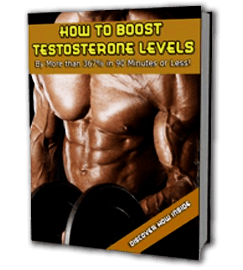(Article Medically Reviewed By Dr. Zach Hyde)
Are Potatoes Killing Your Sex Life?
Even before the advent of the Atkins diet and well before Keto made its way onto the scene, carbohydrates have been much maligned by the media, and even nutritionists around the world.
But are potatoes and rice doing as much harm as these sources would have you believe?
We’ll examine this question in detail below.
Carbs are the #1 Nutrient for Hormonal Health
Dr. Oz and his ideological ilk would have you believe that carbs are the main reason we gain weight.
Of course, we all know that weight gain comes with hormonal issues, health problems, and physical problems that can negatively impact your sex life, such as a fat pad, man boobs, and decreased muscle mass.
But if you turn off the TV and listen to the research for a second, you’ll see that carbs are actually vital to hormone regulation.
In fact, if you look at some of the very best testosterone-boosting foods they’re positively loaded with the stuff.
So what gives?
For one, the neurons in the brain responsible for releasing GnRH are largely triggered by the glucose levels present in the blood.
If you’re not familiar with GnRH, also known as gonadotropin-releasing hormone, it’s basically the “master hormone” that triggers all of the events that lead to testosterone production.
In short: it’s what turns the key on your “baby factory” – and it needs carbs to fire things up.
Then there’s the example of Diazoxide.
This is a drug designed to suppress insulin release, therefore preventing glucose uptake into the body’s cells.
It is generally used to treat symptoms of hypoglycemia, which is a side effect of many health problems.
However, the drug is notorious for torpedoing testosterone levels in male patients.
Why?
Because carbs are suddenly cut out of all of your body’s processes, including testosterone production. From a sex hormone standpoint, it’s like trying to fill up your gas tank while you’re standing on the hose.
Carbohydrates And Testosterone Studies
If you’re arguing that the examples so far are pure speculation, you’ll appreciate this next bit.
In a 1997 study on the relationship between dietary nutrients, resistance exercise, cortisol, and testosterone…
The impact of carbohydrate consumption on testosterone becomes more clear than ever.
Indeed, when subjects performing regular resistance training consumed more protein and fewer carbs (as is often recommended by bodybuilders)…
They ended up suppressing their T production to a degree that was relative to their carb intake.
The more protein and fewer carbs, the more dramatic the drop.
This was backed up by another similar study, which examined the hormonal parameters of subjects who were put on diets that were virtually identical in terms of calories but varied widely in terms of carbs and protein.
The results showed that both T levels and DHT levels were drastically lower in the high-protein / low carb group.
However, the group’s cortisol (stress hormone levels) were much higher.
What does this tell us?
Well, it tells us that carbohydrates have a stress, reducing, testosterone-boosting effect in men.
Considering that cortisol also zaps our T levels at the source, why would we ever consider cutting them from our diets?
Hopefully, by now, you’re convinced of what I’m trying to tell you. However, there’s one more study I want to highlight.
This one is for all of you carb-hating gym rats out there who think eating only a raw buffalo a day is enough to keep your sex juices flowing into your 80s and 90s.
You see, a study from 2010 found that carbs have the ability to assist athletes in a number of ways.
For example, it indicated that men consuming low carb diets while undergoing high-intensity exercise displayed much lower free testosterone levels than their high carb counterparts.
And this was only over the course of three days.
Half a week, and these guys had sapped their T levels into oblivion, making the lean muscle gains they were pursuing that much harder to achieve.
There are Still Good and Bad Carbs
It’s worth noting that I’m not just telling you to eat potatoes and lift weights as an antidote to all of your testosterone worries.
There remains a ton of debate on what sort of carbs trigger which sort of response in your body.
Gluten-rich grains, it seems, may actually lower testosterone release by suppressing the release of GnRH.
The more simple sugar versions (potatoes, fruits, juices, and even cane sugar) don’t’ seem to have this effect.
There’s also the matter of just how many carbs you need to be getting in your daily diet. As with most things, this will largely depend on the person.
However, if it absolutely had to be quantified, you should aim for around 40% to 60% of your daily caloric intake.
If you think that’s going to make you fat, I need to remind you again to turn off the TV.
One researcher lost 27 lbs. easting nothing but chips, sugary cereals, and Twinkies. All he had to do was maintain a caloric deficit.
If that doesn’t do the trick, think about the Japanese rate of obesity compared to the rate here in the US.
Japanese men simply don’t get fat on their traditional diet, even though they average roughly 300 grams of carbohydrate daily.
The same goes for other rice eating cultures, such as Thailand, Indonesia and China.
But they DO get fat when they move here and start eating the traditional American diet with its huge portions and abundance of calories.
Carbohydrates and Testosterone Conclusion:
Don’t let the hype tell you that carbs are the bad guys – they’re actually essential to your hormonal health.
Just make sure to spend some time figuring out what your body needs, rather than try to follow a “one-size-fits-all” nutrition plan.
In my case, I shoot for 50 to 60 percent of calories from carbs, mostly in the form of white rice, and other non glutenous grains.
My total calorie (and carb intake) fluctuates daily depending on my exercise habits.
If I lift weights or run HIIT sprints, I take in more carbs and protein that day to provide the fuel my body need to build muscle and manufacture hormones.
Which takes me to my final rule which has helped me maintain an ideal body weight for nearly two decades.
If I’m not hungry – I don’t eat.



